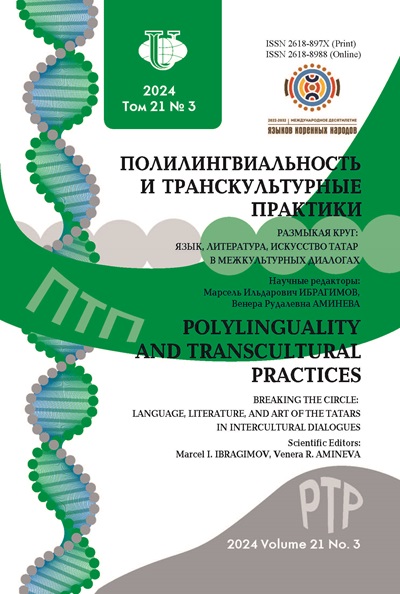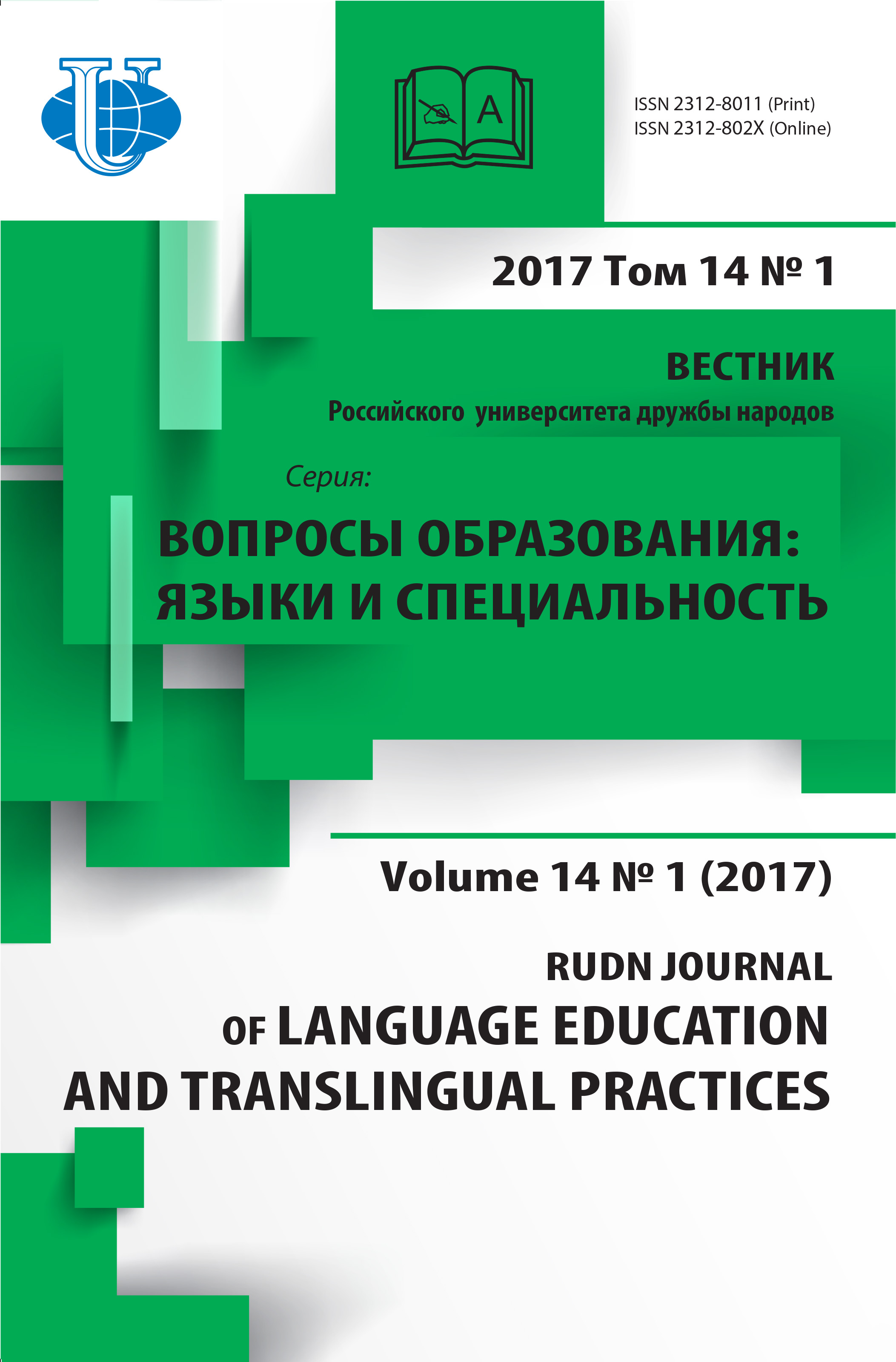Vol 14, No 1 (2017)
- Year: 2017
- Articles: 13
- URL: https://journals.rudn.ru/polylinguality/issue/view/956
- DOI: https://doi.org/10.22363/2312-8011-2017-14-1
Full Issue
ARSENAL
DISCURSIVE STRATEGY OF SCIENTIFIC REPORT AND ITS IMPLEMENTATION
Abstract
 9-17
9-17


ONLINE-TANDEM IN POST-INTERCULTURAL COMMUNITY: SELF-EDUCATION IN COOPERATION
Abstract
The concept “cultures” lost a clear boundary today: only in the sphere of studying and teaching foreign languages it is possible to speak about the standard of speech - verbal and nonverbal aspect; to culture of behavior, culture of clothes, etc.; and, ethnic and social and defined norms adapt to various to situational contexts. For this reason and because of inter-object approach [1. P. 2] to studying of cross-cultural communication - borders of “cross-cultural communication” become more and more indistinct. It can take place between representatives of various cultures on one geographical space (i.e. in one polycultural society) and terms of uniform single-crop community, but consisting of representatives of various floors, generations, professions or social groups. From here need of more detailed approach to expansion of cross-cultural communication results including at learning of foreign languages; and to orientation of the post-integration work (directed on voluntary deep integration with self-identification preservation) - by use of online tandems with carriers of target languages and ethnocultures as native.
 18-27
18-27


RUSSIAN IN GHANA AND STUDENTS’ COMMON ERRORS
Abstract
The motivation for language learning is influenced by political, social and cultural influence. The Russian language was introduced to the academic curriculum at the University of Ghana several decades ago. To understand advantages and disadvantages of Russian learning, it is necessary to reveal what is behind the language policy in Ghana.In this paper, we consider how language structures are used in the Russian language, and how local languages affect it. By means of the influence of both English language and local languages, we observe common errors that appear in students’ speech and papers.
 28-42
28-42


INTENSIVE COURSE OF COMMUNICATIVE ADAPTATION: LINGUOCULTURAL COMPONENT OF LEARNING
Abstract
The article describes a new course in teaching Russian as a Foreign Language - a course of intensive communicative adaptation, which responds to needs people who study Russian language, living and working in Russia. The paper describes the main characteristics of the course, represents a case for students, that includes traditional themes of studying at the basic level of Russian. It is also describes the system of exercises training the intercultural competence. Foreigners from more than 15 countries, living in Russia and working in international companies and diplomatic missions took part in the survey and have tested the course exercises.
 43-53
43-53


LINGUOCULTURE
LOYALTY TO THE CHUVASH LANGUAGE IN DIASPORA GROUP OF MOSCOW REGION
Abstract
This article deals with language loyalty to Chuvash, a truly relic Turkic language, a titular language in the Chuvash Republic, yet mainly spread in diaspora groups. In case of this study it is a diaspora group, inhabiting Moscow and Moscow region. The survey is based on interviewing more than 100 Moscow diaspora members, who claim to be ethnic Chuvash. Apart from an ambiguous category of a native language of ethnic groups in Russia, the paper covers major aspects of ethnic and language loyalty manifested in such categories as A) endogamous marriage practices; B) the prestige and status of other languages as viewed by diaspora members; C) peculiarities of ethnic culture, music, cuisine, customs;wish to transmit this culture to future generations. We’ve noticed two major tendencies. Speakers would like to improve both symbolic and communicative potential of their language.
 54-77
54-77


ALTAI LITERARY CRITICISM: REVIEW OF SCIENTIFIC PUBLICATIONS
Abstract
This article is attempt of panoramic look on modern Altai literary criticism. The author gives an assessment of the current state of Altai science on the material of the most important scientific works published by researchers in the latest time. Special attention is paid to the thematic analysis of scientific works.
 78-84
78-84


LINGUOCULTURAL STUDY OF GENDER STEREOTYPES IN TURKIC PHRASEOLOGY(ON THE MATERIAL OF UZBEK, KAZAKH AND KARAKALPAK LANGUAGES)
Abstract
This article deals with some linguistic features of gender stereotypes in the Turkic phraseologisms. We’ve chosen the opposition “Man” and “Woman” and analyzed it from two points of view. The first is connected to Phraseologisms which are common to both sex referents; the second - to the phraseologisms, which are associated with referents of the same sex. We’ve also represented historical and cultural material for describing positive or negative connotations of these concepts.
 85-92
85-92


LITERARY INTERPRETATION AND THEORY OF TRANSLATION
ON THE TEXT OF A WORK OF LITERATURE AND ON ITS INTERPRETATIVE COMMENTARY(BASED ON THE MATERIAL OF DOSTOEVSKY’S NOVEL “THE GAMBLER”)
Abstract
This paper deals with new theoretical approach to literary text, which is called ‘interpretative commentary’. We have tried to demonstrate it on the material of F. Dostoevsky’s novels. In spite of a long story of Dostoevsky’s novels’ academic publishing their texts still need some corrections. As for their interpretation is should be based on a special, not textological or historical but on so called “interpretative” commentary. Methods used in the article are historical, biographical, literary review; interpretative commentary.
 93-101
93-101


SLOVAK POETRY IN RUSSIAN INTERPRETATIONS
Abstract
At the beginning of the 21st century, the two Slovak poetry collections were published in Russian language (“Golosa stoletiy”, 2002 and “Iz veka v vek”, 2006, 2015). The article gives not only the information оn the mentioned two books, but much attention is given to the way of translation of Slovak authors (M. Valek, L. Feldek, S. Strazhay) by Russian translators (B. Okudzhava, O. Malevich,Mashkova, N. Shvedova). It is shown that the Russian translators retain their own perception, feeling and understanding of Slovak poetry. Certain inadequate transformations in the translation are noticeably just in the stylistic and semantic levels, as well as in the not a full understanding of some specific Slovak historic-cultural reality by translators.
 102-109
102-109


Esse est
BLACK MIRROR: DESTROYING THE IDYLL OF HAPPY CHILDHOOD, OR THE SOCIUM TODAY IN THE MILLENIALS’ POETRY
Abstract
 110-115
110-115


POLYLOG
TRANSLINGUALISM: COMMUNICATIVE BRIDGE OR “CULTURAL BOMB”?
Abstract
 116-121
116-121


INTERACTION
“IN A DOUBLESHARP LANGUAGE”: INTERVIEW WITH ELENA ZEIFERT
 122-139
122-139


SUPPORTMENTS
ELENA ZEYFERT. «PLAVIL'NAYa LODOChKA» (FRAGMENT «KARAGANDINSKOY POVESTI»)
 140-142
140-142















